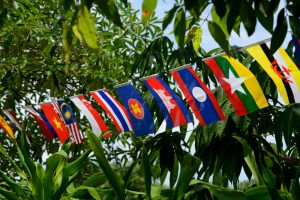The planned special summit between U.S. President Joe Biden and leaders of the Association of Southeast Asian Nations (ASEAN) has reportedly been postponed, after the leaders of one or more Southeast Asian governments said they were unable to attend.
The news of the delay was initially reported in a brief article in the Cambodian government-aligned media outlet Fresh News, which cited Cambodian Foreign Minister Prak Sokhonn. (Cambodia is this year’s chair of ASEAN.) Sokhonn later confirmed it to Reuters, saying that the meeting had “been postponed to a later date because some ASEAN leaders cannot attend the meeting on the proposed dates.”
According to Reuters, Indonesia, which is coordinating the summit, did not immediately confirm the postponement, but an Indonesian official said earlier that options for the schedule were still being discussed.
The White House previously announced that the special meeting would be held in Washington on March 28-29, describing it as an important step in the Biden administration’s attempts to engage Southeast Asia, a region that straddles the Indo-Pacific and that U.S. policymakers view as central to countering China’s rising influence in Asia. White House spokesperson Jen Psaki described it as a “top priority for the Biden-Harris Administration to serve as a strong, reliable partner and to strengthen an empowered and unified ASEAN to address the challenges of our time.”
But recent days have seen a series of vague reports of a possible delay. In a speech this week, Cambodian Prime Minister Hun Sen suggested that the meeting should be delayed after a number of ASEAN’s 10 member states had asked for it to be held two days earlier.
Then, in an article on Tuesday, Bangkok Post columnist Kavi Chongkittavorn claimed that the timing of the event had been the subject of some friction between the two sides. “After several schedule changes,” he wrote, “ASEAN leaders became exasperated about the proposed meeting with Mr Biden in Washington D.C.” He added, “If there is no change to the proposed dates of the summit, it is almost certain that half of the ASEAN leaders will not be able to attend.”
He claimed that the Muslim-majority member states – Indonesia, Malaysia, and Brunei – had to attend Ramadan celebrations, while Thailand had insisted that the meeting be held on March 26-27 in order for Prime Minister Prayut Chan-o-cha who will be at a meeting of the Bay of Bengal Initiative for Multi-Sectoral Technical and Economic Cooperation around that time.
However, one Washington-based source told this observer yesterday that seven nations had confirmed their attendance, one was expected to do so imminently, and that only one country – Thailand – had said it was unable to attend the event on March 28-29. (The tenth member is Myanmar, whose military junta has been excluded from the event in line with ASEAN’s standing policy of allowing only “non-political” representatives from the country to attend.)
Update: Thailand’s Embassy in the United States later clarified via email that they had “offered a compromise suggestion that the leader-focused meetings/activities be arranged on 28 March.”
The misalignment and lack of communication that have surrounded the organization of the summit is unlikely to have a long-term impact on U.S.-ASEAN relations. But it does perpetuate the slightly star-crossed nature of recent American attempts to engage ASEAN leaders. President Donald Trump initially pledged to hold a special U.S.-ASEAN summit in Las Vegas in March 2020, but this was swept aside by the COVID-19 pandemic. Then last May, Secretary of State Antony Blinken was forced to cancel a scheduled call with ASEAN foreign ministers after his in-flight communications network malfunctioned.
The special summit will likely be rescheduled in due course and in the long term this hiccup will be forgotten. But it is nonetheless slightly surprising that the communication between ASEAN and Washington was not more cohesive, and that the two sides did not finalize a date before announcing the summit.
































